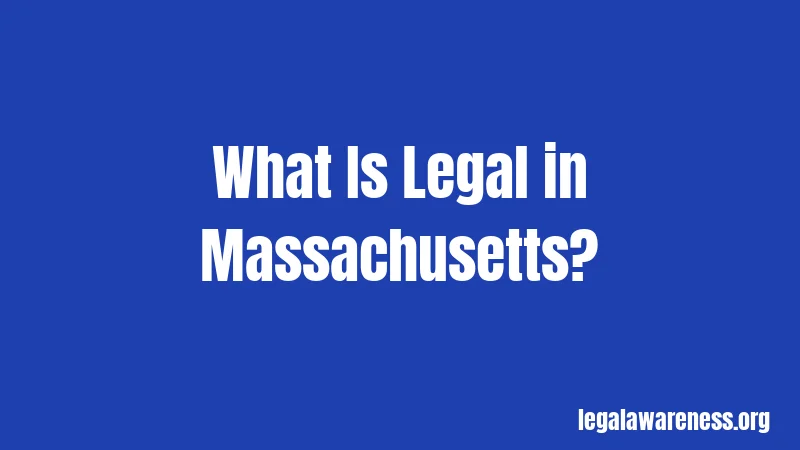Cannabis Laws in Massachusetts (2026): Here’s the Real Deal
Most people think Massachusetts cannabis laws are simple. They’re not. Sure, recreational weed is legal here. But the rules around how much you can carry, where you can use it, and what happens if you break the law? Those get complicated fast.
Let me break it down for you. This guide covers everything you need to know about cannabis in Massachusetts. No legal jargon. No confusing terms. Just the facts.
What Is Legal in Massachusetts?

Massachusetts legalized recreational cannabis in 2016. Voters approved Question 4 by a solid 54% majority. The law went into effect on December 15, 2016. Since then, adults 21 and older can legally buy, possess, and use cannabis.
Here’s the deal. You can possess up to one ounce of cannabis in public. At home, you can keep up to 10 ounces. You can also grow your own plants. And yes, you can buy from licensed dispensaries across the state.
Sounds straightforward, right? Well, it gets more detailed.
How Much Cannabis Can You Possess?
The law has specific limits. Stay within them, and you’re fine. Go over, and you could face penalties.
In Public
You can carry up to one ounce of cannabis. That includes up to five grams of concentrate. Concentrates are things like wax, shatter, or oils. They’re more potent than regular flower.
Got more than an ounce on you? That’s a violation. You could face a $500 fine and up to six months in jail. First-time offenders usually get probation instead. Complete the probation successfully, and your record gets sealed.
At Home
Your home is different. You can possess up to 10 ounces there. You can also keep any cannabis you grew yourself at home. There’s no limit on homegrown cannabis stored at your residence.
But wait, there’s a catch. Anything over one ounce must be locked up. Use a lock box, safe, or secure container. Fail to do this? You face a $100 civil fine and forfeiture of the unsecured cannabis.
Makes sense, right? The law wants to keep cannabis secure. Especially away from kids and pets.
Growing Cannabis at Home

Wondering if you can grow your own? You can. Massachusetts allows home cultivation for adults 21 and older.
The Basic Rules
You can grow up to six plants at your primary residence. If two or more adults live in your home, the maximum is 12 plants total. Not per person. Per household.
Your plants must be in a locked, secure area. They cannot be visible from any public place. No binoculars needed to spot them. Just plain visibility from the street, sidewalk, or any public area.
Grow your plants outdoors? That’s fine. But make sure they’re not visible. Fences, walls, or locked greenhouses work well.
What Happens If You Violate Growing Rules?
Violate the visibility rule? You face a civil fine up to $300. Plus forfeiture of the plants.
Growing seven to 12 plants as a single adult? That’s a $100 civil fine and forfeiture of the excess plants.
Under 21 and growing plants? You face a $100 fine and mandatory drug awareness program. If you’re under 18, your parents get notified too.
Hold on, this part is important. Growing more than 12 plants is a criminal offense. It’s considered cultivation with intent to distribute. That carries serious penalties. We’re talking up to two years in jail and fines up to $5,000.
Where Can You Use Cannabis?
Okay… this one’s important. Just because cannabis is legal doesn’t mean you can use it anywhere.
Private Property Only
You can only consume cannabis on private property. Your home works. A friend’s home works (with their permission). Hotels might allow it. Check their policy first.
Public consumption is illegal. Seriously. This includes streets, sidewalks, parks, beaches, and parking lots. Any place the public can access is off-limits.
Violate this rule? You get a civil fine up to $100. It’s like a parking ticket. But it still costs you.
Special Rules for Social Consumption
Here’s where it gets interesting. Massachusetts approved social consumption lounges in December 2025. These regulations take effect January 2, 2026.
Three new license types exist:
- Supplemental licenses for existing dispensaries
- Hospitality licenses for venues like yoga studios
- Event organizer licenses for temporary events
These lounges will let adults consume cannabis on-site. Think of them like bars, but for cannabis. No alcohol allowed. Food and water required. Mandatory rideshare plans for customers.
Pretty cool, right? Massachusetts will be the first state in New England with legal consumption lounges.
But remember. Towns and cities control whether to allow these lounges. Your town might say no. Check local regulations.
What About Driving?

Never drive high. Seriously.
It’s illegal to drive under the influence of cannabis. Massachusetts has zero tolerance. Any amount of THC in your system while driving can get you arrested.
Penalties for driving under the influence include:
- Fines from $500 to $5,000
- License suspension for 12 months
- Up to 30 months under house arrest
- Possible jail time
Open Container Laws
You also can’t have an open container of cannabis in your car. Open container means any package with a broken seal. Or any container with some contents removed.
Keep cannabis in your trunk. Or in a locked glove compartment. Keep it sealed until you’re somewhere legal to consume it.
Open container violation? That’s a civil fine up to $500.
Crossing State Lines
Don’t do it. Honestly, this is the part most people miss.
It’s illegal to transport cannabis across state lines. Period. Even to states where cannabis is legal. Even if you’re just driving to Vermont or Maine.
This applies to all forms of transportation:
- Cars
- Planes
- Trains
- Boats
- Literally everything
You can’t mail cannabis either. Not even within Massachusetts. Definitely not to other states.
Why? Because cannabis is still illegal under federal law. Interstate commerce involves federal jurisdiction. Cross state lines with cannabis, and you’re breaking federal law.
Medical Marijuana Rules
Massachusetts also has a medical marijuana program. It started in 2012.
Qualified patients 18 and older can register for medical cannabis. They need certification from a licensed physician. Qualifying conditions include:
- Cancer
- Glaucoma
- HIV/AIDS
- Hepatitis C
- ALS
- Crohn’s disease
- Parkinson’s disease
- Multiple sclerosis
Medical patients can possess up to a 60-day supply. That’s typically 10 ounces. They can also grow up to 12 plants (six flowering, six vegetative).
Medical patients under 18 need approval from two physicians. One must diagnose a debilitating, life-limiting condition.
The perks of having a medical card? You can possess more. Grow more. And you might get better pricing at dispensaries.
Penalties for Violations
Let’s talk about what happens when you break these laws. The penalties vary based on what you did and how much cannabis is involved.
Possession Violations
Over one ounce but under two ounces? First offense gets you probation. Second offense? Up to six months in jail and a $500 fine.
Over two ounces? That’s more serious. You could face up to two years in jail and a $2,000 fine.
Underage Possession
If you’re 18 to 20 years old and caught with cannabis, you face a $100 civil fine. The cannabis gets confiscated.
Under 18? Same $100 fine, plus mandatory drug awareness program. Your parents get notified. Fail to complete the program within one year? Delinquency proceedings could follow.
Distribution and Sales
Selling cannabis without a license is a crime. Period. Even small amounts.
Giving away up to one ounce to another adult is legal. But you can’t receive any payment or compensation. No money, no trade, nothing.
Get caught selling? First offense brings up to two years in jail and fines from $500 to $5,000.
Sell to a minor under 18? That’s a felony. Up to five years in prison. Fines up to $5,000.
Trafficking
Trafficking means possessing 50 pounds or more with intent to distribute. Or cultivating that amount. Or bringing it into Massachusetts from another state.
Trafficking carries mandatory minimum sentences:
- 50 to 100 pounds: One to 15 years prison, $500 to $10,000 fine
- 100 to 2,000 pounds: Two to 15 years prison, $2,500 to $25,000 fine
- 2,000 to 10,000 pounds: Three and a half to 15 years prison, $5,000 to $50,000 fine
These are serious charges. Get a lawyer immediately if you’re facing trafficking accusations.
Governor’s Marijuana Pardons
Here’s some good news. Governor Maura Healey pardoned all misdemeanor marijuana possession convictions from before March 13, 2024.
This means thousands of people got relief. They can apply for a pardon certificate. This helps remove civil and legal restrictions from previous convictions.
You can also petition to expunge marijuana offenses. Or seal conviction records. Forms are available through the Massachusetts Court System.
Special Circumstances and Exceptions
A few special rules exist. Let’s cover them.
Federal Property
Cannabis remains illegal on all federal property. This includes:
- Post offices
- Federal buildings
- National parks
- Airports (even in secure areas)
- Military bases
Don’t bring cannabis to these places. Federal law still classifies cannabis as a Schedule III drug. Federal agents can arrest you.
Employment
Employers don’t have to accommodate marijuana use. They can prohibit it at work. They can test for it. They can fire you for testing positive.
Medical marijuana users get some protection. Employers must provide reasonable accommodation under disability law. But they don’t have to allow use at work or being impaired on the job.
Landlords
Landlords can prohibit cannabis use in rental properties. They can ban smoking. They can ban growing plants. Check your lease carefully.
However, landlords cannot prohibit non-smoked consumption unless federal law puts them at risk. Like with federally subsidized housing.
Schools and Youth Centers
Cannabis is absolutely prohibited at:
- K-12 schools
- Preschools
- Youth centers
- Correctional facilities
- Detoxification facilities
This applies even to legal medical patients. Zero tolerance in these areas.
The 2026 Ballot Question
Wait, it gets better. Actually, maybe not better.
A ballot initiative might appear in November 2026. It would repeal Massachusetts’ adult-use cannabis market. Yep, you read that right.
The Coalition for a Healthy Massachusetts collected enough signatures. The question would:
- End all recreational cannabis sales
- Ban home cultivation
- Keep possession of up to one ounce decriminalized
- Add penalties for one to two ounces
Medical marijuana would remain legal. But the $1.6 billion recreational market would disappear.
Will it pass? Hard to say. Massachusetts voters approved legalization 54% to 46% in 2016. But things change. Stay informed. Vote in November 2026 if this question makes the ballot.
How to Buy Cannabis Legally
Buying cannabis in Massachusetts is easy. Just follow these steps.
Find a Licensed Dispensary
Massachusetts has licensed dispensaries throughout the state. The Cannabis Control Commission website has a complete list. Search by location to find one near you.
Bring Valid ID
You must be 21 or older. Bring government-issued ID. Driver’s license, passport, or state ID work.
Out-of-state visitors can buy cannabis too. But remember. You must consume it in Massachusetts. Can’t take it home across state lines.
Know Your Limits
Dispensaries won’t sell you more than one ounce at a time. This includes all cannabis products combined. Edibles, flower, concentrates—everything counts toward the one ounce limit.
Understand Taxes
Massachusetts charges:
- 10.75% state excise tax
- 6.25% state sales tax
- Up to 3% local option tax
Total tax ranges from 17% to 20%. Factor this into your budget.
Store It Safely
Once you buy cannabis, store it properly. Keep it in child-resistant packaging. Lock it up if you have more than one ounce. Keep it away from kids and pets.
Tips for Staying Legal
You’re not alone. This confuses a lot of people. Here are some quick tips to help you stay on the right side of the law.
1. Know Your Limits
One ounce in public. 10 ounces at home. Six plants per person, 12 per household. Memorize these numbers.
2. Keep It Private
Only consume on private property. Never in public. Never while driving. Never where tobacco smoking is banned.
3. Lock It Up
Secure anything over one ounce. Use a lock box or safe. This protects kids and keeps you legal.
4. Don’t Cross State Lines
Never transport cannabis across state lines. Not even to legal states. Not even a little bit.
5. Check Local Rules
Towns and cities can add restrictions. Some ban dispensaries. Some ban home cultivation. Check your local ordinances.
6. Respect Others
Your neighbors might not like cannabis. Keep odors contained. Keep plants hidden. Be a good neighbor.
7. Don’t Drive High
Seriously. Call an Uber. Take the T. Walk. Just don’t drive.
What to Do If You’re Charged
Facing marijuana charges? Here’s what you should do.
Get a Lawyer
Criminal defense attorneys specialize in drug cases. They know Massachusetts law. They can help keep violations off your record. Or negotiate a favorable plea deal.
Can’t afford a lawyer? Ask for a public defender. You have this right.
Understand Your Options
First-time offenders often get probation. Complete it successfully, and charges get dropped. Your record gets sealed.
Drug courts exist for some offenses. They offer treatment programs instead of jail time. Ask your lawyer if you qualify.
Don’t Talk to Police Without a Lawyer
You have the right to remain silent. Use it. Politely decline to answer questions without your attorney present.
Future Changes Coming in 2026
Massachusetts cannabis laws keep evolving. Here’s what’s coming.
Social Consumption Lounges
Regulations take effect January 2, 2026. Licensed businesses will open throughout 2026. This creates new opportunities for social use.
Possible Repeal
The 2026 ballot question could end recreational cannabis. It’s a real possibility. Stay informed. Vote.
Federal Rescheduling
President Trump signed an executive order to reschedule cannabis from Schedule I to Schedule III. This doesn’t legalize it federally. But it reduces restrictions. Could affect banking, research, and medical access.
Frequently Asked Questions
Can I smoke cannabis in my apartment?
It depends. Check your lease. Landlords can prohibit smoking. But they usually can’t ban non-smoked consumption like edibles.
Can I give cannabis to a friend?
Yes. You can give up to one ounce to another adult 21 or older. No payment or trade allowed. It must be a true gift.
What if I get caught with cannabis at the airport?
Airports are federal property. Cannabis is illegal there. TSA might refer you to local police or federal agents. Don’t bring cannabis to airports.
Can I lose my job for using cannabis?
Yes. Employers can prohibit cannabis use. They can test for it. They can fire you for testing positive. Even for off-duty use.
Do I need a medical card to buy cannabis?
No. Adults 21 and older can buy from recreational dispensaries without a medical card. But medical cards offer benefits like higher possession limits and potential tax savings.
Final Thoughts
Massachusetts cannabis laws are more complex than most people realize. But they’re not that hard to follow. Stay within the limits. Keep consumption private. Lock up excess amounts. Don’t drive high. Don’t cross state lines.
The key is knowing the rules. Now you do. Stay informed, stay safe, and enjoy responsibly.
And remember. Laws can change. The 2026 ballot question might alter everything. Stay engaged. Vote. Make your voice heard.
When in doubt? Look it up or ask a lawyer. Better safe than sorry.
References
- Massachusetts General Laws Chapter 94G – Regulation of the Use and Distribution of Marijuana Not Medically Prescribed https://malegislature.gov/Laws/GeneralLaws/PartI/TitleXV/Chapter94G
- Cannabis Control Commission – Know the Laws https://masscannabiscontrol.com/know-the-laws/
- Massachusetts.gov – Law About Recreational Marijuana https://www.mass.gov/info-details/massachusetts-law-about-recreational-marijuana
- Cannabis Control Commission – Social Consumption Regulations (December 2025) https://masscannabiscontrol.com/2025/12/massachusetts-cannabis-control-commission-unanimously-approves-final-social-consumption-regulations/
- Ballotpedia – Massachusetts Eliminate Recreational Marijuana Sales Initiative (2026) https://ballotpedia.org/Massachusetts_Alter_Marijuana_Regulation_Laws_Initiative_(2026)
